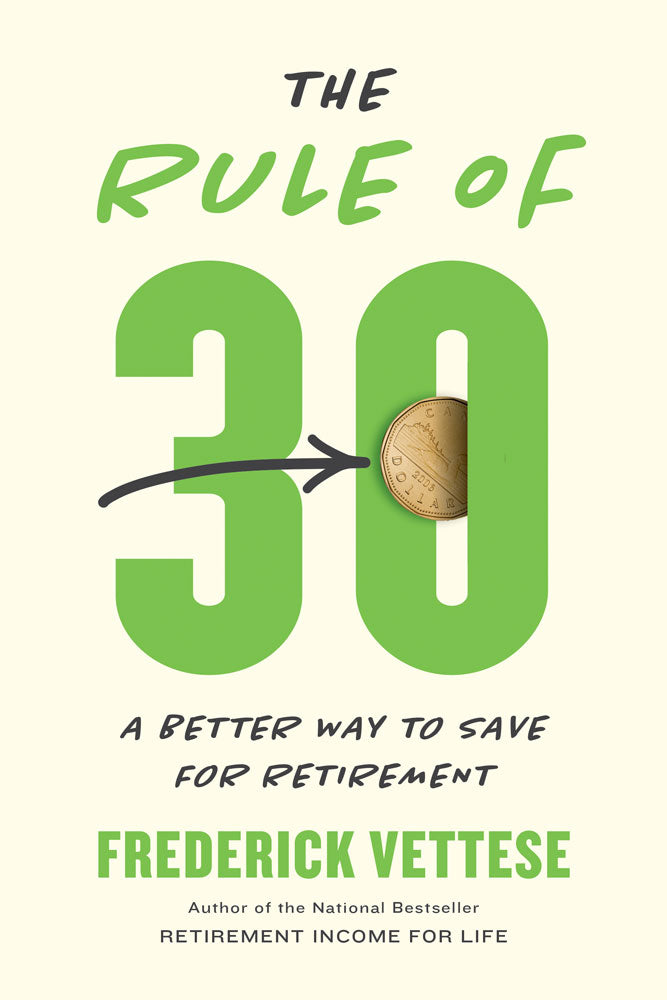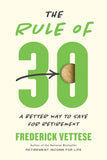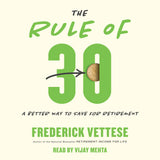The Rule of 30: A Better Way to Save for Retirement
$18.99-
With the cost of buying a home or renting an apartment soaring to previously unseen heights, how can Gen Y even begin to think about saving for retirement? Are your knees knocking? Are you nervously biting your nails? Maybe you don’t need to be.
In The Rule of 30, personal finance expert Frederick Vettese provides a surprising — and hopeful — answer to balancing the costs of living with the costs of saving for retirement. Through conversations between a young couple and their neighbour, a retired actuary, the couple and the reader discover:
- How the future investment climate will differ from the recent past and why it requires a different approach to saving
- The problem with saving a constant percentage of pay
- The Rule of 30 and why it is a more rational and personalized way to save
- Whether investing in real estate is a viable alternative to investing in stocks
- The impact renting versus owning your home has on your retirement savings
The Rule of 30 changes the mindset from saving the same flat percentage of pay to saving when it is most convenient to your situation. In most cases, it means less saving early on while mortgage payments are high and children are costly, and more saving later when our earnings are at their highest and expenses at their lowest.
Saving for retirement is a high priority, but it is not the only priority in life. It is time to dispense with old and often unrealistic myths like “just save 10% of your take-home pay.” The truth is we should save differently throughout our pre-retirement years — and The Rule of 30 is a road map for doing so.
BUY FROM:
Price may vary by retailer
Check availability at your local Canadian independent bookstore:
Remember that most stores can easily order books they don’t currently have in stock.
BUY FROM ECW PRESS:
Frederick Vettese is the former Chief Actuary of Morneau Shepell (now TELUS Health). He has written hundreds of articles for The Globe and Mail and the National Post, plus four books on Canadian retirement issues. The third edition of Retirement Income for Life is targeted at savers who are retired or nearing retirement and want to turn their life savings into sustainable income. Frederick grew up in Toronto, where he continues to live with his wife, Michelle. He graduated from the University of Toronto with an Honours Bachelor of Science degree before studying to become an actuary.
-
Published: October 2021
ISBN: 9781770416178
Dimensions: 6 x 9 in.
Pages: 224
Reviews
“Vettese’s superpower is to look at personal finance from a new perspective. In The Rule of 30 he strikes again, offering up a new, empowering and action-oriented approach to retirement savings.” — Bruce Sellery, CEO, Credit Canada and Money Columnist, CBC Radio
“Do you want to retire comfortably? Start planning and executing now. Fred’s book, The Rule of 30, is a good blueprint to follow and reads like a story. Your future self will thank you.” — Robin R. Speziale, National Bestselling Author, Market Masters
“An accessible read that offers a fresh perspective on saving and investing for retirement.” — Money We Have
“The Rule of 30 offers new ideas and timeless wisdom for retirement saving, conversationally delivered by the friendly retired actuary next door. This is a must-read for anyone wondering how they can possibly save enough for retirement.” — Ben Felix & Cameron Passmore, Hosts, The Rational Reminder Podcast
“The Rule of 30 answers the question we’ve all been asking about expensive housing: How will young couples with big mortgages and daycare bills carve out room for retirement saving?” — Rob Carrick, Personal Finance Columnist, The Globe and Mail
“It offers an absolutely brilliant solution to the burning question of how much to save for retirement throughout your working years. In addition to the rule of 30 and other retirement savings insights, Mr. Vettese shares his insightful wisdom about why the future will be different with a look at inflation, wage increases, interest rates, expected returns for bonds, and the wildly unpredictable stock market.” — Boomer & Echo



